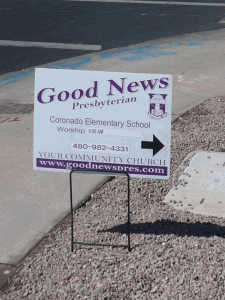Free Speech for Whom?
< < Go Back
The Supreme Court overturns ‘content’ speech regulation.
Clarence Thomas isn’t often the Supreme Court’s swing Justice, but he was on Thursday as the Court ruled on two cases that illuminate when the government can restrict speech. His answer is that the government has more power to do so when the speech belongs to the government.
The High Court issued a welcome verdict in Reed v. Town of Gilbert, ruling unanimously that the Arizona town’s limits on signs announcing church services violated the First Amendment. Gilbert said that Pastor Clyde Reed’s signs directing people to his church could be no larger than six square feet and displayed only 12 hours before and one hour after an event. The town put no such limits on political and ideological signs, and the Court ruled that this amounted to content discrimination against Rev. Reed.
“Innocent motives do not eliminate the danger of censorship presented by a facially content-based statute, as future government officials may one day wield such statutes to suppress disfavored speech,” wrote Justice Thomas, who was joined by the four conservatives and Justice Sonia Sotomayor.
Justices Stephen Breyer and Elena Kagan concurred in the judgment, but they wrote separately to say that such speech regulations should not be subject to “strict” legal scrutiny. “Regulatory programs almost always require content discrimination,” Justice Breyer wrote. “And to hold that such content discrimination triggers strict scrutiny is to write a recipe for judicial management of ordinary government regulatory activity.”
To the contrary, strict scrutiny is a brushback pitch to local governments that regulations restricting speech can’t discriminate by content. A more lenient standard would invite more speech regulation, and thus more judicial challenges.
Justice Thomas joined the Court’s liberals in the day’s other speech case, Walker v. Texas Division, Sons of Confederate Veterans. Texas denied the group its application for a specialty license plate featuring a confederate flag, and the Court ruled 5-4 that this speech restriction passes constitutional muster.
Freedom of speech doesn’t apply when the government is the speaker, wrote Justice Breyer for the majority, because Texas license plates “are, essentially, government IDs.”
More From The Wall Street Journal (subscription required):




